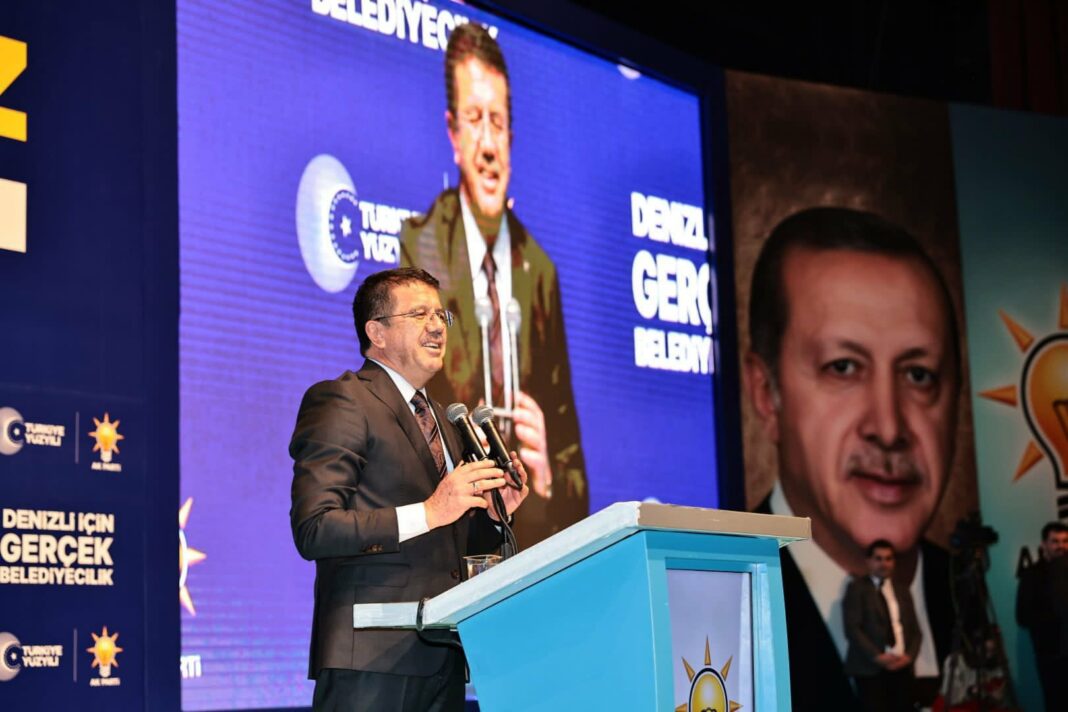A senior official from Turkey’s ruling Justice and Development Party (AKP) has acknowledged that recent investigations targeting İstanbul’s opposition mayor and two executives from a top business group have negatively affected the country’s economy.
Nihat Zeybekci, a former economy minister and now a deputy chair of the AKP, responsible for economic affairs, said the fallout from the March 19 detention of İstanbul Mayor Ekrem İmamoğlu and his subsequent arrest caused financial damage and criticized the detention of two executives from Turkey’s leading industrial group, the Turkish Industry and Business Association (TÜSİAD), after they criticized government policies earlier this year.
Speaking on Ekol TV, Zeybekci said, “There’s no denying it, March 19 [the day İmamoğlu was detained] harmed the economy. The financial markets reacted. The real impact will emerge over six months, a year, even two, but we’ve already seen the damage.”
The detention of İmamoğlu, President Recep Tayyip Erdoğan’s strongest political rival and the presidential candidate of his main opposition Republican People’s Party (CHP), triggered financial turmoil. The Turkish lira fell sharply following his arrest, prompting the central bank to deliver a surprise interest rate hike in April, abruptly ending a rate-cutting cycle that had begun earlier in the year.
According to the European Bank for Reconstruction and Development, Turkey’s central bank sold more than $40 billion in foreign exchange in the weeks after İmamoğlu’s arrest. The intervention pushed net reserves, excluding swaps, from over $60 billion to under $20 billion, raising concerns about the sustainability of Turkey’s reserve position.
İmamoğlu was put in pretrial detention on March 23, on what rights groups and opposition leaders widely view as politically motivated charges. İstanbul prosecutors have accused him of corruption and terrorism-related offenses, allegations İmamoğlu and his party strongly deny. The move is seen by many observers as a critical step by Erdoğan to sideline challengers and consolidate power ahead of the next presidential election scheduled for 2028.
Zeybekci also criticized the treatment of TÜSİAD President Orhan Turan and High Advisory Council Chair Ömer Aras, who were taken in for questioning by police in late February as part of an investigation. TÜSİAD is Turkey’s most influential business group, representing companies that account for more than half the country’s economic output.

At TÜSİAD’s monthly general assembly on February 13, they broke the group’s long silence about what many call democratic backsliding in the country and the erosion of the rule of law, in a move that attracted the government’s anger.
Turan and Aras talked about mounting economic and political risks in the country and pointed to rising government intervention in the private sector, executive control over the judiciary and worsening economic hardship.
They said judicial investigations into opposition political figures create concern in society and damage democracy, which prompted their detention and the imposition of a travel ban on them. Criminal charges were filed against them in March.
“I was the first to call our TÜSİAD president when the legal process began,” Zeybekci said. “He’s not just a business leader, he’s a friend. I expressed my support. I cannot accept that someone representing an organization that covers 60 to 70 percent of Turkey’s economy was escorted by police for questioning.”
Zeybekci visited Turan and Aras at TÜSİAD headquarters in İstanbul in late April and criticized their detention under police escort.

“It was not appropriate to bring the TÜSİAD chairman in for questioning under police escort,” he said, noting his past role as economy minister advocating for business leaders’ international mobility.
Zeybekci served as economy minister in four different AKP governments and was appointed deputy head of the Presidential Economic Policy Board in 2018. He later ran unsuccessfully as the AKP’s mayoral candidate for İzmir in 2019. In October 2023 he was elected to the party’s Central Executive Board and put in charge of economic affairs.
His remarks come at a time when the Turkish government is under international scrutiny for intensifying pressure on political rivals, journalists and civil society leaders, even as the government faces a fragile economic recovery.
Şimşek confronted over İmamoğlu arrest at Doha forum

Meanwhile, Turkish Finance Minister Mehmet Şimşek faced pointed questions about İmamoğlu’s arrest during a panel event at the Qatar Economic Forum in Doha this week. Speaking with Bloomberg Economics and Politics Editor Stephanie Flanders, Şimşek discussed recent economic reforms but was pressed on the political risks surrounding Turkey’s investment climate.
Flanders referred to İmamoğlu’s March arrest and noted that international investors remain wary of returning to Turkey as she cited the sharp depreciation of the lira that followed İmamoğlu’s detention. She asked about the steps he will take to bring back long-term investors.
Şimşek declined to comment directly on İmamoğlu’s arrest or its market repercussions. Instead, he stressed the credibility of Turkey’s three-year economic roadmap. “This program is sound, and it’s working,” Şimşek said, listing improvements in inflation trends and fiscal discipline.
He acknowledged that inflation remains high but said it had declined to its lowest point in the past 40 months. “Investors have started to come back,” Şimşek said, offering an optimistic outlook without addressing concerns over the rule of law or democratic backsliding.
Turkey has experienced double digit inflation since 2019, with the annual rate peaking at 85.5 percent in October 2022. It has declined over the years and currently stands at around 38 percent, according to official data.

